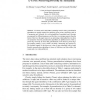Free Online Productivity Tools
i2Speak
i2Symbol
i2OCR
iTex2Img
iWeb2Print
iWeb2Shot
i2Type
iPdf2Split
iPdf2Merge
i2Bopomofo
i2Arabic
i2Style
i2Image
i2PDF
iLatex2Rtf
Sci2ools
SDMW
2009
Springer
2009
Springer
L-Cover: Preserving Diversity by Anonymity
To release micro-data tables containing sensitive data, generalization algorithms are usually required for satisfying given privacy properties, such as k-anonymity and l-diversity. It is well accepted that k-anonymity and l-diversity are proposed for different purposes, and the latter is a stronger property than the former. However, this paper uncovers an interesting relationship between these two properties when the generalization algorithms are publicly known. That is, preserving l-diversity in micro-data generalization can be done by preserving a new property, namely, l-cover, which is to satisfy l-anonymity in a special way. The practical impact of this discovery is that it may potentially lead to better heuristic generalization algorithms in terms of efficiency and data utility, that remain safe even when publicized.
Generalization Algorithms | Heuristic Generalization Algorithms | Micro-data Generalization | SDMW 2009 | Security Privacy |
| Added | 27 May 2010 |
| Updated | 27 May 2010 |
| Type | Conference |
| Year | 2009 |
| Where | SDMW |
| Authors | Lei Zhang 0004, Lingyu Wang, Sushil Jajodia, Alexander Brodsky |
Comments (0)

